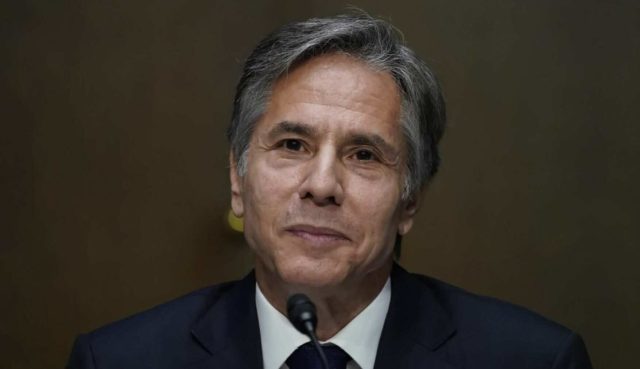
US restores sanctions waiver to Iran with nuclear talks in final phase Secretary of State Antony Blinken. (Kent Nishimura/Los Angeles Times/TNS)
This article was originally published by Radio Free Europe/Radio Liberty and is reprinted with permission.
The United States has restored sanctions waivers to Iran to allow international nuclear cooperation projects, as indirect talks between Tehran and Washington aimed at salvaging the 2015 nuclear deal enter a critical phase.
The waivers were rescinded by the United States under former President Donald Trump, who pulled out of the agreement and reimposed crippling sanctions.
The U.S. State Department has sent a report signed by Secretary of State Antony Blinken to Congress explaining that restoring the waivers will help the talks in Vienna on returning to the deal, formally called the Joint Comprehensive Plan of Action (JCPOA).
“The waiver with respect to these activities is designed to facilitate discussions that would help to close a deal on a mutual return to full implementation of the JCPOA and lay the groundwork for Iran’s return to performance of its JCPOA commitments,” according to the report, a copy of which was seen by Reuters.
“It is also designed to serve U.S. nonproliferation and nuclear-safety interests and constrain Iran’s nuclear activities. It is being issued as a matter of policy discretion with these objectives in mind, and not pursuant to a commitment or as part of a quid pro quo,” the report said.
The activities, according to the report, include the redesign of Iran’s Arak heavy-water reactor, the preparation and modification of its underground Fordow facility for stable isotope production, and operations, training, and services related to its Bushehr nuclear power plant, among several other things.
The waiver was needed to allow for technical discussions that were key to the talks about a return to the deal, a senior State Department official said.
The official added that restoring the waiver was not a signal that the United States is on the verge of reaching an understanding to return to the deal.
Iranian Foreign Minister Hossein Amir-Abdollahian said on February 5 the U.S. move to restore sanctions waivers to Tehran was not enough and Washington should provide guarantees for the revival of the 2015 nuclear deal.
“The lifting of some sanctions can in itself translate into good faith,” Amir-Abdollahian said in comments published by Iranian state media.
“While what is on paper is good, it’s not enough,” he added.
“We demand guarantees in the political, legal and economic spheres. Certain agreements have already been reached,” he added.
“We did NOT provide sanctions relief for Iran and WILL NOT until/unless Tehran returns to its commitments under the JCPOA,” State Department spokesman Ned Price said on Twitter on February 4.
“We did precisely what the last administration did: permit our international partners to address growing nuclear nonproliferation and safety risks in Iran,” Price said.
The United States and Iran have held eight rounds of indirect talks in Vienna since April aimed at reinstating the pact that lifted sanctions against Tehran in exchange for significant restrictions on its sensitive nuclear activities.
There has been no formal announcement on when the ninth round would start, but expectations intensified that it could be next week.
After Trump pulled the United States out of the deal in 2018 and reimposed harsh sanctions, Iran gradually started reducing its commitments under the deal.
President Joe Biden has promised to rejoin the deal if Tehran returns to full compliance.
The latest talks in Vienna were “among the most intensive that we had to date,” a U.S. official told reporters earlier this week, speaking on condition of anonymity.
The official added that there had been some progress in narrowing down the list of differences and that now is the time for political decisions.




